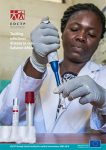EDCTP-funded R&D partnerships to tackle infectious disease in Sub-Saharan Africa, 2003-2018
On 17 September 2018 at the High-Level Meeting to discuss a third EDCTP programme in Lisbon, Portugal, Dr Michael Makanga, EDCTP’s Executive Director, presented a collection of success stories illustrating EDCTP’s contribution to the fight against poverty-related infectious diseases over a period of 15 years. On behalf of EDCTP, he expressed his deep gratefulness for the efforts of all who have been associated with the EDCTP journey.
This overview of selected EDCTP-funded clinical studies, fellowships, networks of excellence and other capacity development initiatives showcases EDCTP’s success in bringing together researchers and institutions in Europe and Africa to advance interventions for infectious diseases.
The challenge
Poverty-related infectious diseases – HIV, tuberculosis, malaria, neglected infectious diseases and others – affect millions of people across sub-Saharan Africa. They have a devastating impact on individuals, families and communities and also on the economy of countries through high healthcare costs and loss of productivity. Therefore, tackling infectious diseases is central to most if not all Sustainable Development Goals.
There are however, several challenges:
- Developing new interventions – diagnostics, vaccines and drugs – is a long, complex and expensive process. For infections that mainly affect low-income countries, the lack of a significant market is a major disincentive to commercial investment in new product development.
- Safety and efficacy of new products is generally determined on populations in high-income countries. However, it is already clear that their safety and efficacy will not necessarily be the same when used in African populations.
- Overall, very little safety and efficacy data are available for some vulnerable populations – such as children and pregnant women.
- In recent years, researchers in academia, industry and product development partnerships recent years have achieved tremendous progress in drug discovery and new product development. However, clinical evaluation of these products is a significant bottleneck.
The EDCTP programme
Set up in 2003 as a key EU contribution to the Millennium Development Goals, EDCTP covers this vital R&D phase of clinical evaluation.
- It brings together researchers and institutions in Europe with those in sub-Saharan Africa to carry out clinical trials on new interventions and improved formulations for the most important infectious diseases affecting the continent.
- As many African countries lack the human and infrastructure capacity to conduct high-quality clinical trials to international standards, capacity development has been fundamental to EDCTP’s work.
- A complementary aim has been to build a supportive environment for research, through projects that develop the regulatory and ethical review capacity of countries in sub-Saharan Africa, so they can evaluate research proposals and oversee clinical research in compliance with ethical principles and international regulatory standards.
The scope
The EDCTP scope was enlarged in its second programme.
- The first EDCTP programme focused on HIV, tuberculosis and malaria.
- EDCTP2 has the same overall aims but its scope has expanded to include neglected infectious diseases – which collectively affect a billion people – diarrhoeal diseases, lower respiratory tract infections, and emerging and re-emerging infections such as Ebola and yellow fever. Special attention is also paid to antimicrobial resistance which is eroding the power of drugs to control infections.
The impact
EDCTP has had a major impact across all its target diseases and has catalysed the creation of international partnerships of lasting value in the battle against infectious disease.
HIV
- EDCTP-funded studies made vital contributions to the development of antiretroviral drug formulations tailored to children –facilitating their widespread introduction in Africa.
- Other landmark studies were carried out in prevention of mother-to-child transmission of HIV and in detection and treatment of opportunistic fungal infections – responsible for one in five HIV-related deaths.
Tuberculosis
- For tuberculosis (TB), EDCTP-funded research played a pivotal role in the evaluation of the Xpert MTB/RIF diagnostic technology, now recommended by WHO and widely implemented globally.
- Other studies have advanced the development of diagnostics for use in special groups, such as children and people with HIV infections.
- Landmark drug trials have identified possible ways to shorten TB drug treatment and have also been hugely influential in shaping how TB drug trials should be carried out.
Malaria
- EDCTP-funded trials have generated key evidence on antimalarial use in pregnant women – who are particularly susceptible to malaria, which can harm both mothers and their developing babies.
- Other trials have had a significant influence on the choice of antimalarial drugs for children.
Research capacity
Across all these areas, EDCTP funding has had a major impact on the development of clinical research capacity.
- Researchers at all career stages have been supported, including more than 100 fellows many of whom have gone on to secure leadership positions in African science and are mentoring the next generation of clinical researchers.
- Institutions across sub-Saharan African have been helped to establish facilities able to carry out international standard trials.
- Regional Networks of Excellence have been created enabling countries to share expertise, coordinate activities and undertake major multicentre international trials.
The future
Building on EDCTP1’s successes, newly funded EDCTP2 projects are continuing to address the key infectious disease challenges in sub-Saharan Africa, with infants, children, women and other vulnerable groups an important focus. Innovative vaccine development projects have been launched in malaria, TB and HIV. A globally important platform for TB drug evaluation is being strengthened, and new international networks established to facilitate research on emerging infections in emergency situations.
New medical interventions are being evaluated for neglected infectious diseases such as schistosomiasis and leishmaniasis. Importantly, EDCTP’s work is leaving a lasting legacy – not just in accelerating access to new interventions but in the people and facilities now in place to lead clinical research in Africa in the future.
The third EDCTP programme, part of the Horizon Europe initiative and due to launch in 2021, will build on this foundation to drive forward an African-led clinical research agenda addressing its key infectious disease challenges.

 Download
Download